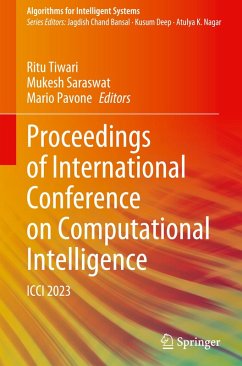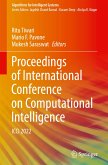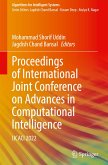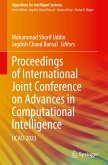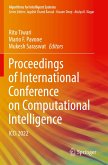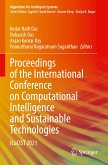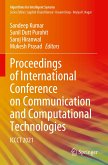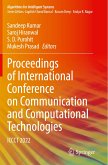Proceedings of International Conference on Computational Intelligence
ICCI 2023
Herausgegeben:Tiwari, Ritu; Saraswat, Mukesh; Pavone, Mario
Proceedings of International Conference on Computational Intelligence
ICCI 2023
Herausgegeben:Tiwari, Ritu; Saraswat, Mukesh; Pavone, Mario
- Gebundenes Buch
- Merkliste
- Auf die Merkliste
- Bewerten Bewerten
- Teilen
- Produkt teilen
- Produkterinnerung
- Produkterinnerung
The book presents high-quality research papers presented at International Conference on Computational Intelligence (ICCI 2023) held at Sardar Vallabhbhai National Institute of Technology, Surat, India, during 4-5 November 2023. The topics covered are artificial intelligence, neural network, deep learning techniques, fuzzy theory and systems, rough sets, self-organizing maps, machine learning, chaotic systems, multi-agent systems, computational optimization ensemble classifiers, reinforcement learning, decision trees, support vector machines, hybrid learning, statistical learning,…mehr
Andere Kunden interessierten sich auch für
![Proceedings of International Conference on Computational Intelligence Proceedings of International Conference on Computational Intelligence]() Proceedings of International Conference on Computational Intelligence216,99 €
Proceedings of International Conference on Computational Intelligence216,99 €![Proceedings of International Joint Conference on Advances in Computational Intelligence Proceedings of International Joint Conference on Advances in Computational Intelligence]() Proceedings of International Joint Conference on Advances in Computational Intelligence231,99 €
Proceedings of International Joint Conference on Advances in Computational Intelligence231,99 €![Proceedings of International Joint Conference on Advances in Computational Intelligence Proceedings of International Joint Conference on Advances in Computational Intelligence]() Proceedings of International Joint Conference on Advances in Computational Intelligence217,99 €
Proceedings of International Joint Conference on Advances in Computational Intelligence217,99 €![Proceedings of International Conference on Computational Intelligence Proceedings of International Conference on Computational Intelligence]() Proceedings of International Conference on Computational Intelligence216,99 €
Proceedings of International Conference on Computational Intelligence216,99 €![Proceedings of the International Conference on Computational Intelligence and Sustainable Technologies Proceedings of the International Conference on Computational Intelligence and Sustainable Technologies]() Proceedings of the International Conference on Computational Intelligence and Sustainable Technologies193,99 €
Proceedings of the International Conference on Computational Intelligence and Sustainable Technologies193,99 €![Proceedings of International Conference on Communication and Computational Technologies Proceedings of International Conference on Communication and Computational Technologies]() Proceedings of International Conference on Communication and Computational Technologies149,99 €
Proceedings of International Conference on Communication and Computational Technologies149,99 €![Proceedings of International Conference on Communication and Computational Technologies Proceedings of International Conference on Communication and Computational Technologies]() Proceedings of International Conference on Communication and Computational Technologies231,99 €
Proceedings of International Conference on Communication and Computational Technologies231,99 €-
-
-
The book presents high-quality research papers presented at International Conference on Computational Intelligence (ICCI 2023) held at Sardar Vallabhbhai National Institute of Technology, Surat, India, during 4-5 November 2023. The topics covered are artificial intelligence, neural network, deep learning techniques, fuzzy theory and systems, rough sets, self-organizing maps, machine learning, chaotic systems, multi-agent systems, computational optimization ensemble classifiers, reinforcement learning, decision trees, support vector machines, hybrid learning, statistical learning, metaheuristics algorithms, machine vision, Internet of Things, image processing, image segmentation, data clustering, sentiment analysis, big data, computer networks, signal processing, supply chain management, web and text mining, distributed systems, bioinformatics, embedded systems, expert system, forecasting, pattern recognition, planning and scheduling, time series analysis, human-computer interaction, web mining, natural language processing, multimedia systems, and quantum computing.
Produktdetails
- Produktdetails
- Algorithms for Intelligent Systems
- Verlag: Springer / Springer Nature Singapore / Springer, Berlin
- Artikelnr. des Verlages: 978-981-97-3525-9
- 2024
- Seitenzahl: 740
- Erscheinungstermin: 18. Juli 2024
- Englisch
- Abmessung: 241mm x 160mm x 43mm
- Gewicht: 1339g
- ISBN-13: 9789819735259
- ISBN-10: 9819735254
- Artikelnr.: 70445074
- Herstellerkennzeichnung Die Herstellerinformationen sind derzeit nicht verfügbar.
- Algorithms for Intelligent Systems
- Verlag: Springer / Springer Nature Singapore / Springer, Berlin
- Artikelnr. des Verlages: 978-981-97-3525-9
- 2024
- Seitenzahl: 740
- Erscheinungstermin: 18. Juli 2024
- Englisch
- Abmessung: 241mm x 160mm x 43mm
- Gewicht: 1339g
- ISBN-13: 9789819735259
- ISBN-10: 9819735254
- Artikelnr.: 70445074
- Herstellerkennzeichnung Die Herstellerinformationen sind derzeit nicht verfügbar.
Dr. Ritu Tiwari is currently working as a Professor in the Department of Computer Science and Engineering at Indian Institute of Information Technology (IIIT) Pune. Before joining IIIT Pune, She was an Associate Professor in the Department of Information and Communication Technology at ABV- Indian Institute of Information Technology and Management (IIITM) Gwalior. She has 12 years of teaching and research experience. Her field of research includes Robotics, Artificial Intelligence, Soft Computing, and Applications. She has published 05 books and more than 80 research papers in various national and international journals/conferences and is the reviewer for many international journals/conferences. Dr. Tiwari received the Young Scientist Award from the Chhattisgarh Council of Science & Technology in 2006. She also received Gold Medal in her Post Graduation from NIT Raipur. Dr. Mukesh Saraswat is an Associate Professor at Jaypee Institute of Information Technology, Noida, India. Dr. Saraswat has obtained his Ph.D. in Computer Science & Engineering from ABV-IIITM Gwalior, India. He has more than 19 years of teaching and research experience. He has guided 02 PhD students, more than 50 M. Tech. and B.Tech. dissertations, and presently guiding 05 Ph.D. students. He has published more than 55 journal and conference papers in the area of image processing, pattern recognition, data mining, and soft computing. He was the part of successfully completed DRDE funded project on image analysis and currently running two projects funded by SERB-DST (New Delhi) on Histopathological Image Analysis and Collaborative Research Scheme (CRS), Under TEQIP III (RTU-ATU) on Smile. He has been an active member of many organizing committees of various conferences and workshops. He is also a guest editor of the Array, journal of Swarm Intelligence, and Journal of Intelligent Engineering Informatics. He is an active member of IEEE, ACM, CSI Professional Bodies. His research areas include Image Processing, Pattern Recognition, Mining, and Soft Computing. Dr. Mario F. Pavone: Prof. Mario F. Pavone is currently working as an Associate Professor in Computer Science at the Department of Mathematics and Computer Science, University of Catania, Italy. Prof. Pavone is focused on the design and development of Metaheuristics applied in several research areas, such as in Combinatorial Optimization; Computational Biology; Network Sciences and Social Networks. Prof. Pavone was visiting professor with a fellowship at the Faculty of Sciences, University of Angers, France in 2016. From August 2017, Prof. Pavone is a member of the IEEE Task Force on the Ethical and Social Implications of Computational Intelligence, for the IEEE Computational Intelligence Society (IEEE CIS). Since February 2015, Prof. Pavone is the Vice-Chair of the Task Force on Interdisciplinary Emergent Technologies for the IEEE Computational Intelligence Society (Emergent Technologies Technical Committee - ETTC), whose main aim is to promote the interdisciplinary study of emergent computation in bio-informatics, bio-physics, interdisciplinary domains of economy, medicine, and industry. Prof. Pavone also served as the Chair of the Task Force on Artificial Immune Systems for the IEEE Computational Intelligence Society (IEEE CIS). Prof. Pavone is a member of several Editorial Boards for international journals and many Program Committees in international conferences and workshops. Prof. Pavone also has extensive experience organizing successful workshops, symposiums, conferences and summer schools. Prof. Pavone was also an Invited Speaker for several international conferences, and Editor of many special issues in: Artificial Life, Engineering Applications of Artificial Intelligence (EAAI), Applied Soft Computing (ASOC), BMC Immunology, Natural Computing, and Memetic Computing. Etc. Prof. Pavone is the co-founder of Tao Science Research center, and the Scientific Director of ANTs Lab - Advanced New Technologies research laboratory. Prof. Pavone was visiting professor at the School of Computer Science, University of Nottingham, UK, and a visiting researcher at the IBM-KAIST Bio-Computing Research Center, Department of Bio and Brain Engineering, at the Korea Advanced Institute of Science and Technology (KAIST) in 2009 and 2006 respectively.
Modeling the Optical Gain of Erbium-Doped Fiber Amplifiers in Strong Cross-Gain Modulation Regime Employing Artificial Neural Networks.- The fuzzy logic model for machining data selection.- Hybrid Weighted Ensemble Model for Early Diagnosis of Parkinson Disorder Using Voice Features.- Advancements In CT Image Reconstruction: An Exploration of Conventional and Deep Learning-Driven Approaches.- Machine Learning-Assisted Food Quality Index Determination For Healthcare.- A Survey on Detection of Man-in-the-Middle Attack in IoMT Using Machine Learning Techniques.- An Application of Deep Learning Using Leaky Rectified Linear Unit and Hyperbolic Tangent in Non Destructive Testing.- Binary Probing: A Novel Approach for Efficient Hash Table Operations.- AI in Mechanical Design: Generate Specific Components.- Solution Of ECG Inverse Problem Using Artificial Neural Network.- The Impact of Artificial Intelligence Technology in learning Zones.- From Stateless to Stateful: A Comparative Analysis of Stateful Serverless Computing Frameworks.- An Online Learning and Problem Solving (OLPS) EEG Database for Mental Workload Assessment and Its Initial Benchmark Classification Performance.- Convolutional Neural Networks-Based Evaluation of Disease Severity in Grape Plant Using Colored and Grayscale Leaf Images.- A Parallel Non-Dominated Sorting Genetic Algorithm-II for Vehicle Routing Problem in Supply Chain.- Massively Parallel GPU Implementation of The TLBO Algorithm for Solving High-Dimensional Systems of Nonlinear Equations.- Support Vector Machine Based Classification for Telemedicine Based on ECG Data.- Concept of Application of Heuristic Models for SMART Management in the Medium-Sized Industrial Enterprise.- Sentiment Analysis Using Ensemble of Deep Learning Models.- A Comparative Study and Review on Load Balancing Algorithms in Hybrid Cloud-Fog Computing.- Optimized Advancements in Next-Generation Recommendation Engines for Personalized Experiences on OTT Platforms.- Shapley Additive Explanations for Machine Emotion Intelligence in CNNs.- Simulation And Performance Evaluation of WSN Based Wild Animal Protection Architecture Using NS2.- Numerical simulations using SCAPS-ID software on variation of ETL, HTL and absorbing layers of contemporary organic solar cells with neoteric DOE Approach as a soft computing tool.
Modeling the Optical Gain of Erbium-Doped Fiber Amplifiers in Strong Cross-Gain Modulation Regime Employing Artificial Neural Networks.- The fuzzy logic model for machining data selection.- Hybrid Weighted Ensemble Model for Early Diagnosis of Parkinson Disorder Using Voice Features.- Advancements In CT Image Reconstruction: An Exploration of Conventional and Deep Learning-Driven Approaches.- Machine Learning-Assisted Food Quality Index Determination For Healthcare.- A Survey on Detection of Man-in-the-Middle Attack in IoMT Using Machine Learning Techniques.- An Application of Deep Learning Using Leaky Rectified Linear Unit and Hyperbolic Tangent in Non Destructive Testing.- Binary Probing: A Novel Approach for Efficient Hash Table Operations.- AI in Mechanical Design: Generate Specific Components.- Solution Of ECG Inverse Problem Using Artificial Neural Network.- The Impact of Artificial Intelligence Technology in learning Zones.- From Stateless to Stateful: A Comparative Analysis of Stateful Serverless Computing Frameworks.- An Online Learning and Problem Solving (OLPS) EEG Database for Mental Workload Assessment and Its Initial Benchmark Classification Performance.- Convolutional Neural Networks-Based Evaluation of Disease Severity in Grape Plant Using Colored and Grayscale Leaf Images.- A Parallel Non-Dominated Sorting Genetic Algorithm-II for Vehicle Routing Problem in Supply Chain.- Massively Parallel GPU Implementation of The TLBO Algorithm for Solving High-Dimensional Systems of Nonlinear Equations.- Support Vector Machine Based Classification for Telemedicine Based on ECG Data.- Concept of Application of Heuristic Models for SMART Management in the Medium-Sized Industrial Enterprise.- Sentiment Analysis Using Ensemble of Deep Learning Models.- A Comparative Study and Review on Load Balancing Algorithms in Hybrid Cloud-Fog Computing.- Optimized Advancements in Next-Generation Recommendation Engines for Personalized Experiences on OTT Platforms.- Shapley Additive Explanations for Machine Emotion Intelligence in CNNs.- Simulation And Performance Evaluation of WSN Based Wild Animal Protection Architecture Using NS2.- Numerical simulations using SCAPS-ID software on variation of ETL, HTL and absorbing layers of contemporary organic solar cells with neoteric DOE Approach as a soft computing tool.

